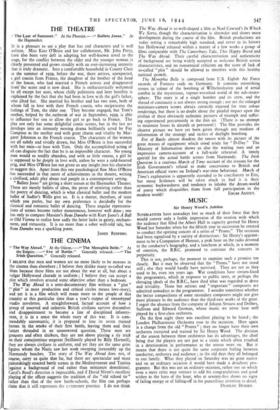MUSIC
Sir Henry Wood's Jubilee
SUPERLATIVES have nowadays lost so much of their force that they would convey only a feeble impression of the ovation with which the audience that filled the Albert Hall to capacity greeted Sir Henry Wood last Saturday when for the fiftieth year in succession he entered to conduct the opening concert of a series of " Proms." The occasion had been signalised by a variety of distinctions : Sir Henry's appoint- ment to be a Companion of Honour, a peak hour on the radio devoted to the conductor's biography, and a luncheon at which, in a moment of emotion, the B.B.C. promised to continue the concerts in perpetuity.
This is not, perhaps, the moment to examine such a promise too closely. But it may be observed that the " Proms." have not stood still ; else they would hardly have survived. They are not as they used to be, even ten years ago. War conditions have stream-lined the programmes, which in response to public taste, or perhaps the elevating ideals of the B.B.C., have shed what was regarded as dross and triviality. None but serious and " important " composers are admitted nowadays to the programmes. I wonder sometimes whether the better compositions of some secondary composers might not give more pleasure to the audience than the third-rate works of the great. I regret the absence from the company of Johann Strauss and Delibes, Sullivan and Edward German, whose music we never hear well played by a first-class orchestra. On the first night there was excellent playing to be heard ; the London Philharmonic Orchestra rose to the occasion. Here again is a change from the old " Proms." ; they no longer have their own orchestra recruited and trained by Sir Henry Wood. The division of the season between three orchestras has its advantages, the chief being that the players are not put to a strain which often resulted in a deterioration in performance as the season wort on. But it means that there is not quite the same corporate feeling between conductor, orchestra and audience ; in the old days they all belonged to one family. What they played on Saturday was no great matter and on an ordinary occasion it would have made a desultory pro- gratnme. But this was not an ordinary occasion, rather one on which even a mere critic may venture to add his congratulations and good wishes to the hero of the hour, who at seventy-five shows no signs of failing energy or of falling-off in his punctilious attention to detail.
DYNELEY HUSSEY.


























 Previous page
Previous page